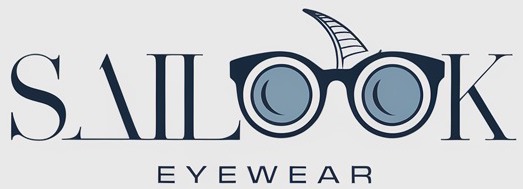When choosing sunglasses, one of the most crucial decisions revolves around the frame material. Two popular options are acetate and metal frames. Each comes with its own unique set of characteristics, strengths, and weaknesses. But how do you decide which is right for you? This article will break down the differences between acetate and metal frames, helping you make an informed choice when purchasing your next pair of sunglasses. Ready to learn about both materials and find out which one suits your needs? Let’s dive in.
1. What Are Acetate and Metal Frames in Sunglasses?
Acetate and metal frames are two of the most common materials used in the eyewear industry. Both materials have distinct features that make them popular among sunglasses wearers. But here’s the kicker—what makes them stand apart? Let’s explore the key differences between them.
Acetate frames are made from a plant-based plastic known for their flexibility and comfort. They are hypoallergenic and can be molded into various shapes and colors, making them highly customizable. These frames are also known for their lightweight feel, which makes them comfortable for long wear.
On the other hand, metal frames are often made from materials like stainless steel, titanium, or aluminum. They are sturdy, durable, and often more adjustable than acetate frames. The strength of metal frames makes them resistant to bending and breaking, which is why they are popular for those seeking long-lasting eyewear.
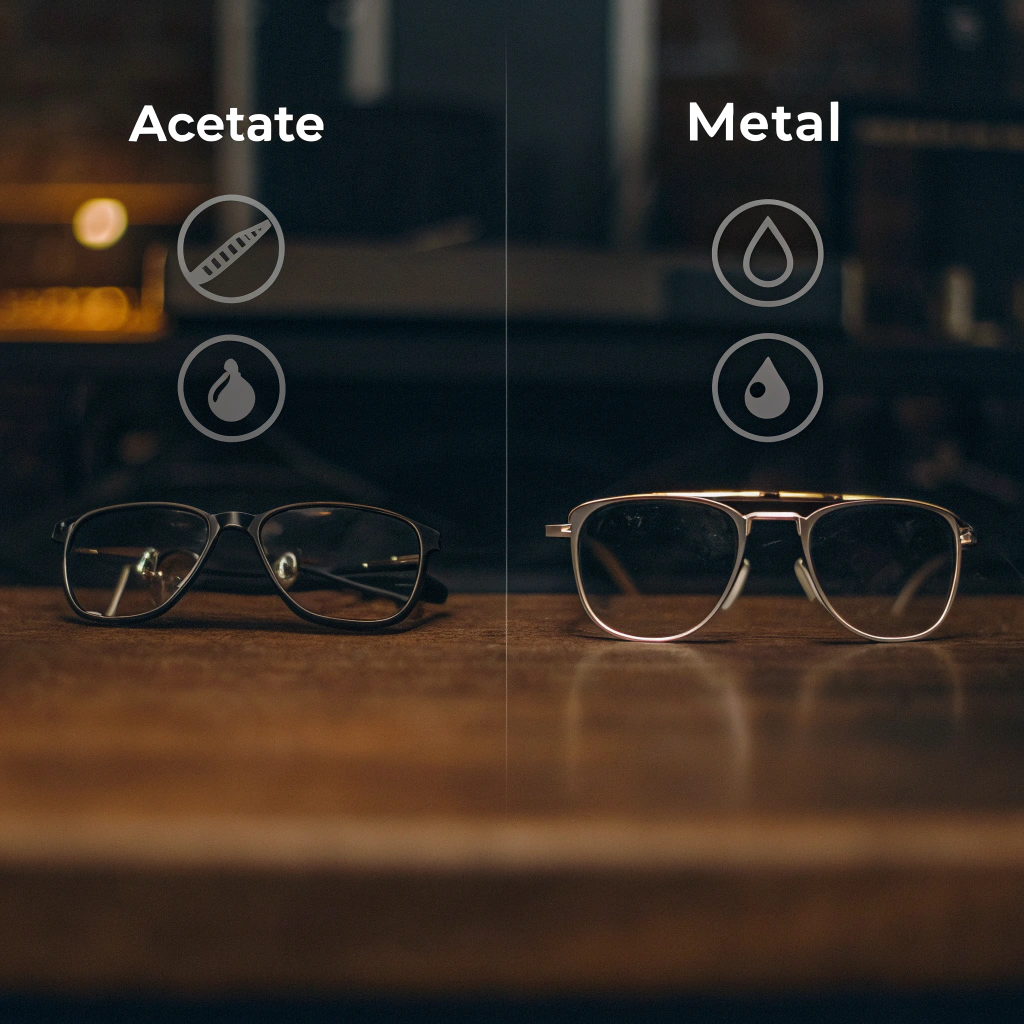
Despite their differences, both acetate and metal frames are highly sought after. The choice ultimately depends on personal preferences like style, comfort, and durability. So, what makes acetate stand out? And why do some people swear by metal frames? Let’s explore the benefits of each.
| Material | Durability | Flexibility | Customization | Weight |
|---|---|---|---|---|
| Acetate | High | High | High | Light |
| Metal | Very High | Low | Moderate | Light to Heavy |
2. What Are the Benefits of Acetate Frames for Sunglasses?
Acetate frames offer a wide range of benefits that make them a go-to choice for many. Ready for the good part? Let’s break down what makes acetate so appealing.
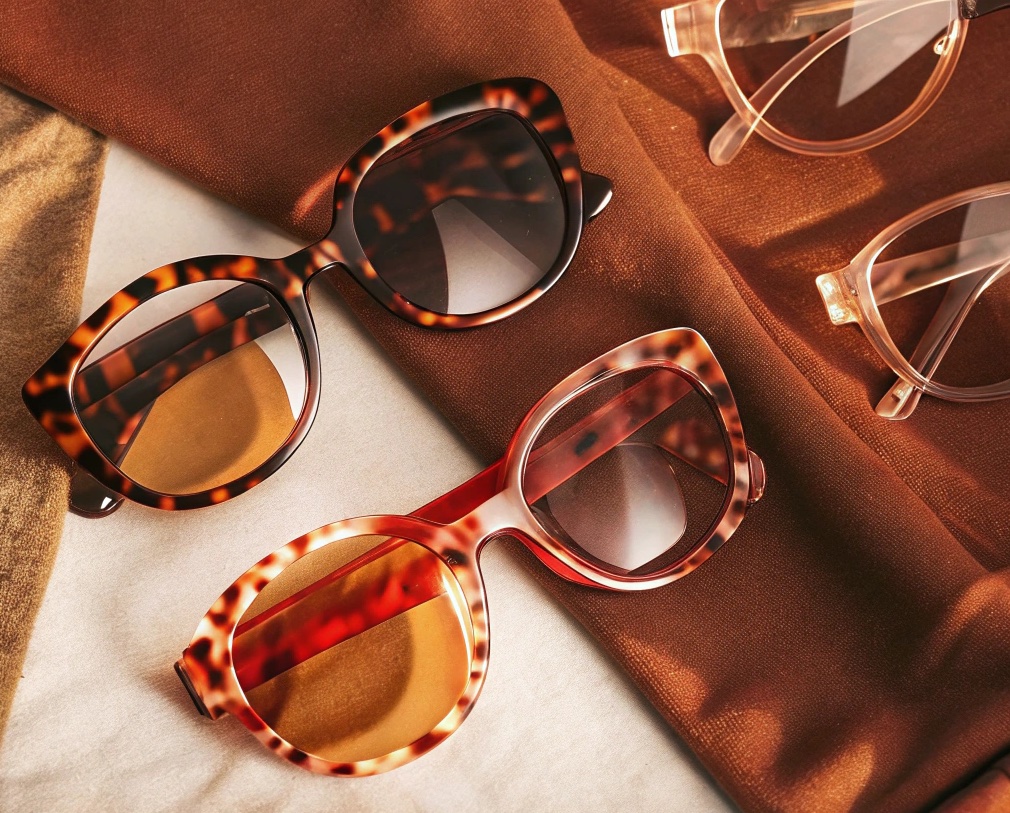
First, acetate is highly customizable. You can find acetate frames in various colors, patterns, and finishes, making them perfect for anyone who values style and personalization. Acetate frames also come in a variety of shapes and sizes, allowing for an almost infinite number of design possibilities. This makes acetate sunglasses ideal for fashion-conscious consumers who want to stand out from the crowd.
Another major benefit of acetate frames is their comfort. Acetate is lightweight and flexible, making the frames feel lighter on your face, even during long wear. They can also be adjusted to provide a better fit, which is especially beneficial for those with unique face shapes. Moreover, acetate frames are hypoallergenic, which means they are less likely to cause skin irritation.
Acetate frames are also known for their durability. While not as strong as metal frames, they offer a solid level of resistance to wear and tear. Plus, the material is more resistant to corrosion and rust compared to metal. If you’re someone who values aesthetics, comfort, and flexibility, acetate frames might be the perfect choice for your next pair of sunglasses.
| Feature | Benefit |
|---|---|
| Customization | Wide range of colors and patterns |
| Comfort | Lightweight, flexible, and hypoallergenic |
| Durability | Resistant to wear, rust, and corrosion |
3. What Are the Benefits of Metal Frames for Sunglasses?
Metal frames have been a staple in eyewear for years, and for good reason. What’s the real story behind their popularity? Let’s dig deeper into the benefits of metal frames.
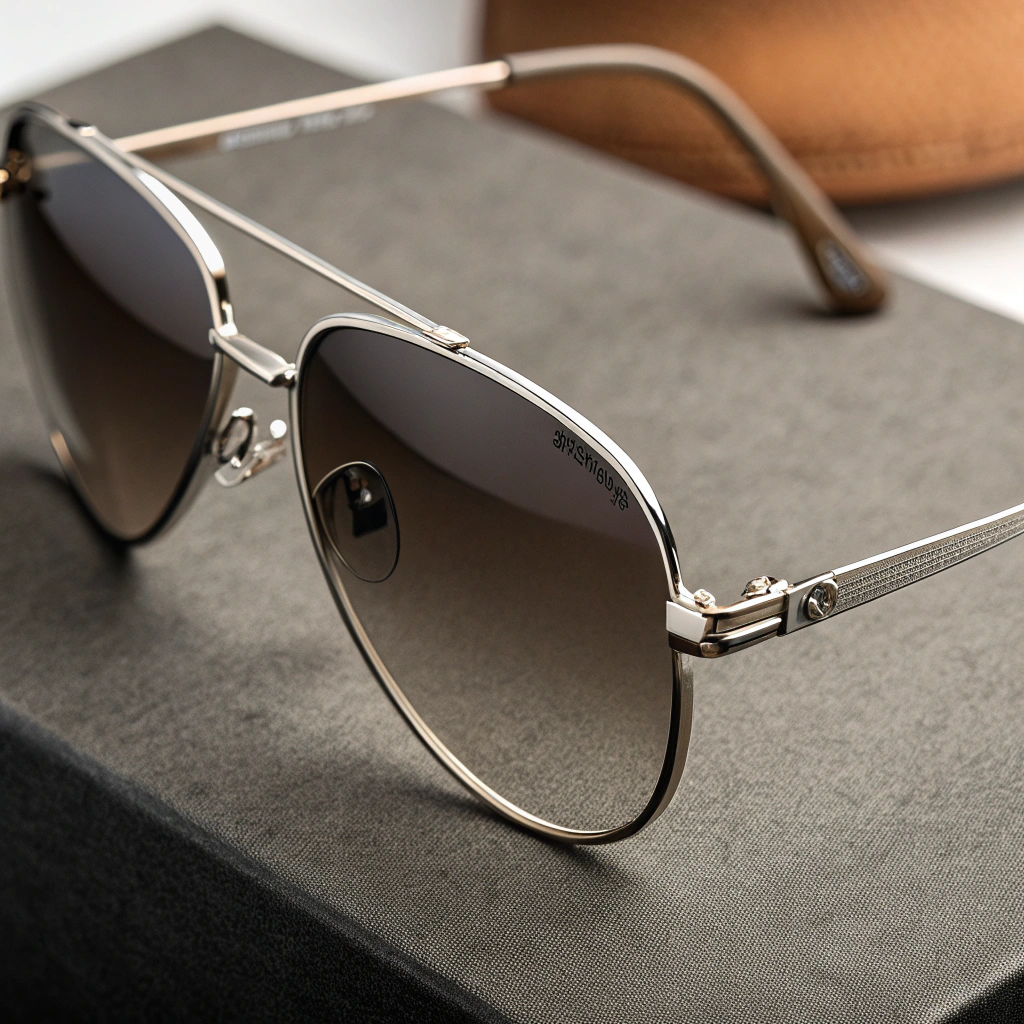
First, metal frames are extremely durable. Unlike acetate, which can bend or break under pressure, metal frames are built to last. They are often made from materials like titanium or stainless steel, both of which are known for their strength and resilience. This means metal frames are less likely to be damaged from daily wear and tear.
Second, metal frames are highly adjustable. If you have a specific face shape or need a more precise fit, metal frames can be bent or molded to accommodate your needs. This makes them an excellent option for individuals who have difficulty finding eyewear that fits perfectly. Metal frames are also lighter than many people expect, especially titanium frames, which are incredibly strong yet lightweight.
Lastly, metal frames offer a sleek, minimalist look that appeals to many eyewear buyers. They are often perceived as timeless and classic, making them suitable for a variety of occasions and styles. If you prefer a more understated, professional appearance, metal frames might be just what you’re looking for.
| Material | Durability | Adjustability | Aesthetic | Weight |
|---|---|---|---|---|
| Titanium | Very High | High | Sleek, minimalist | Very Light |
| Stainless Steel | High | Moderate | Classic, professional | Moderate |
4. How Does Acetate Compare to Metal Frames in Terms of Durability?
When it comes to durability, acetate and metal frames each have their pros and cons. Let’s break it down.
Acetate is known for its resistance to fading and cracking, but it can be susceptible to breaking if dropped or bent too hard. However, with proper care, acetate frames can last a long time. The material is also resistant to corrosion, which is a major advantage when compared to metal frames that may rust over time.
Metal frames, particularly those made from high-quality materials like titanium, are extremely durable. They are resistant to bending, breaking, and even scratches. Metal frames are also more likely to withstand harsh weather conditions, making them an ideal choice for those who need their sunglasses to endure extreme conditions.
So, which one is more durable? It really depends on the specific use case. If you’re looking for a frame that’s more flexible and resistant to impact, acetate may be a better option. If long-term strength and resistance to wear are your top priorities, metal frames will likely be a more durable choice.
| Frame Type | Durability | Resistance to Scratches | Impact Resistance |
|---|---|---|---|
| Acetate | Moderate | High | Low |
| Metal | High | Moderate | High |
5. How Does Acetate Affect the Comfort of Sunglasses?
Comfort is a key factor when choosing sunglasses, and acetate frames excel in this department. But here’s the kicker—what makes acetate so comfortable?
First, acetate is a lightweight material, which means your sunglasses won’t feel heavy on your face, even after hours of wear. The flexibility of acetate also allows the frames to adjust to the shape of your face, providing a custom fit. This means that acetate sunglasses are less likely to cause discomfort, even if you wear them all day.
Furthermore, acetate is hypoallergenic, making it an excellent choice for those with sensitive skin. The material is smooth and gentle against the skin, reducing the likelihood of irritation. If comfort is your number one priority, acetate frames are a great option.
| Feature | Benefit |
|---|---|
| Weight | Light, comfortable for extended wear |
| Flexibility | Custom fit to face shape |
| Skin Sensitivity | Hypoallergenic material |
6. How Does Metal Impact the Comfort of Sunglasses?
When it comes to comfort, metal frames have their advantages and drawbacks. But here’s where it gets interesting—metal frames may not be as universally comfortable as acetate, but they can still provide a great wearing experience when properly adjusted.
Metal frames, especially those made from high-quality materials like titanium, are often lightweight and sturdy. While they’re not as flexible as acetate, their adjustable nature allows you to mold the frames to your face shape. This means you can achieve a personalized fit. For those who find acetate frames too loose or tight, metal frames might offer a more customizable option.
Despite their adjustability, metal frames may feel slightly heavier than acetate, especially when made from stainless steel or other materials that are not as lightweight as titanium. However, many metal frame designs are engineered to balance durability and comfort. If you wear your sunglasses all day long, you may want to opt for a titanium frame, which provides both comfort and strength.
So, how does metal compare to acetate in terms of comfort? Metal frames are a solid choice for those who need adjustability and a firm, secure fit but may not be as ideal for those seeking ultra-lightweight, flexible frames.
| Frame Material | Comfort Features | Adjustability | Durability |
|---|---|---|---|
| Titanium | Light, comfortable, hypoallergenic | High | Very High |
| Stainless Steel | Moderate comfort, robust | Moderate | High |
7. Which Material Offers Better Design Versatility?
When it comes to design versatility, both acetate and metal frames offer their unique advantages. But what’s the real story behind these two materials when it comes to fashion?
Acetate frames are highly versatile in terms of color and pattern options. You can find acetate sunglasses in just about any color, and the material can be molded into intricate designs. If you’re looking for bold, vibrant, or unique sunglasses, acetate offers the most room for customization. From tortoiseshell to vibrant hues, acetate frames allow designers to express creativity, making them ideal for fashion-forward individuals.
Metal frames, on the other hand, are known for their classic, minimalist style. While they may not offer the same array of colors and patterns as acetate, metal frames can still be stylish in their simplicity. They are available in different finishes like matte, brushed, and polished, which gives them a timeless, professional look. Metal frames are great for those who prefer understated elegance and versatility that goes with any outfit.
So, which material is more versatile in terms of design? It depends on your style. If you’re after bold, customizable designs, acetate frames are the way to go. If you prefer a classic, sophisticated look, metal frames will serve you well.
| Material | Design Flexibility | Style | Customization |
|---|---|---|---|
| Acetate | High | Bold, vibrant | Very High |
| Metal | Moderate | Classic, professional | Moderate |
8. How Do Acetate and Metal Frames Hold Up to Everyday Wear?
Let’s face it—your sunglasses are likely to face some rough handling, whether it’s being thrown into a bag or left in the car. But here’s the kicker—how do acetate and metal frames compare when it comes to everyday wear?
Acetate frames are quite durable but require some care. While they are resistant to fading and are generally scratch-resistant, they can crack or break if dropped or bent excessively. However, their flexibility does make them more forgiving than metal frames in some cases. The key to ensuring the longevity of acetate frames is regular cleaning and proper storage.
Metal frames, especially those made from materials like stainless steel and titanium, tend to hold up better to everyday wear and tear. They are less likely to bend, break, or lose their shape, making them more resistant to damage. Metal frames are also better suited for harsher conditions and are less likely to develop permanent damage if dropped.
In terms of resilience, metal frames have the edge when it comes to withstanding everyday use. If you’re rough on your sunglasses, metal frames are likely a better choice. If you’re gentle with your eyewear, acetate will serve you just fine.
| Material | Scratch Resistance | Durability | Impact Resistance |
|---|---|---|---|
| Acetate | Moderate | High | Low |
| Metal | High | Very High | High |
9. Which Material Is More Environmentally Friendly?
Sustainability is becoming an increasingly important consideration in the fashion and eyewear industries. So, which material is better for the environment—acetate or metal?
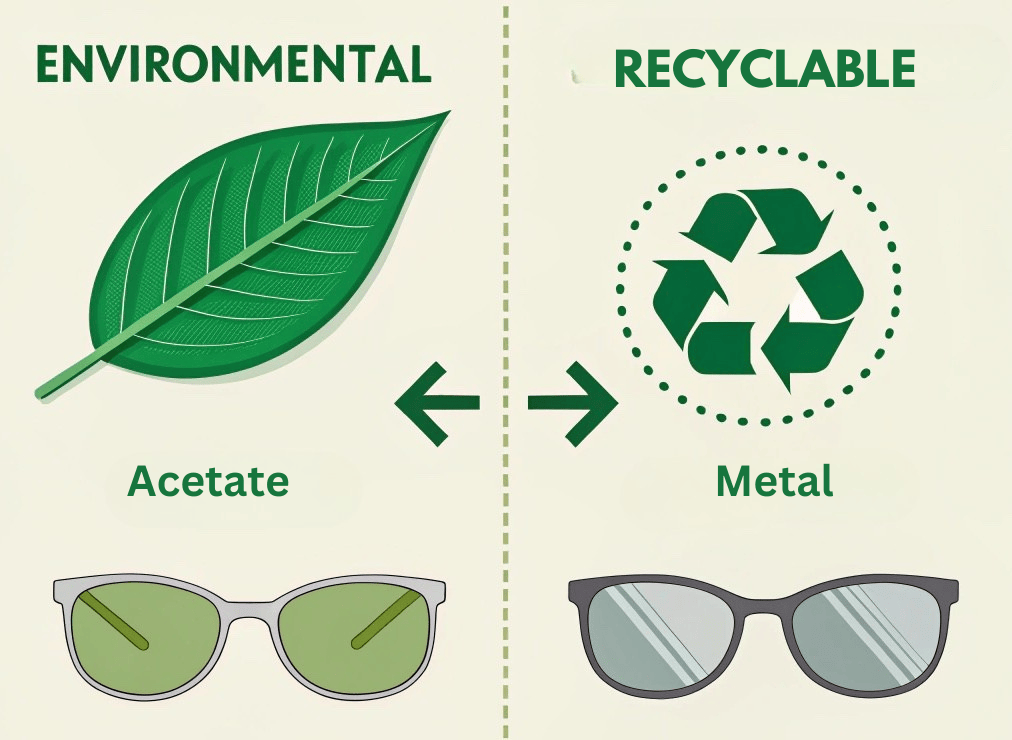
Acetate is often seen as the more eco-friendly option due to its plant-based origins. Made from cotton and wood fibers, acetate is biodegradable, which means it breaks down naturally over time. Additionally, many eyewear brands are moving toward using sustainable acetate materials that are free from harmful chemicals. So, if sustainability is high on your list of priorities, acetate frames may be the right choice.
Metal frames, particularly those made from stainless steel or titanium, are generally more durable and longer-lasting, which can reduce the need for replacements. However, metals do require energy-intensive extraction and processing, which can have a larger carbon footprint compared to acetate. Some metals, like titanium, are more recyclable than others, but in general, metal frames are not as environmentally friendly as acetate.
If you’re looking for a more sustainable option, acetate frames made from renewable resources are the better choice. However, if longevity and recyclability are more important, metal frames—especially those made from titanium—might be a more sustainable option in the long run.
| Material | Sustainability | Biodegradability | Recyclability |
|---|---|---|---|
| Acetate | High | Yes | Moderate |
| Metal | Moderate | No | High (for titanium) |
10. What Are the Costs of Acetate vs. Metal Frames in Sunglasses?
Cost is an essential consideration when choosing sunglasses. So, what’s the price difference between acetate and metal frames?
Acetate frames generally fall in the mid-range when it comes to pricing. They are more affordable than premium metal options, but they can be more expensive than basic plastic frames. The cost of acetate frames can vary depending on the brand, style, and the complexity of the design. High-end acetate frames with intricate patterns or special finishes may come at a higher price point.
Metal frames, particularly those made from high-quality materials like titanium, tend to be more expensive. Titanium frames, for example, are known for their durability and lightness, but they come at a premium price. Stainless steel frames are usually more affordable than titanium but still cost more than acetate frames in many cases.
If budget is a concern, acetate frames are generally more affordable, while metal frames, especially those made from titanium, can be pricier. Consider your budget and needs when deciding between the two.
| Frame Type | Price Range | Premium Options | Average Cost |
|---|---|---|---|
| Acetate | Moderate | High-end designs | $50-$300 |
| Metal | Moderate to High | Titanium, Stainless Steel | $100-$500 |
11. How Do Acetate and Metal Frames Affect the Weight of Sunglasses?
When selecting sunglasses, weight can be a significant factor. So, how do acetate and metal compare when it comes to weight?
Acetate frames are lightweight, which makes them more comfortable for extended wear. However, acetate is not always as light as some metal materials, particularly titanium. The weight of acetate frames can vary depending on the thickness of the frame and the design. But overall, acetate frames are lighter than many people think, making them a great choice for comfort.
Metal frames can vary in weight depending on the material used. Titanium frames are incredibly lightweight and durable, making them ideal for those who want both strength and comfort. Stainless steel frames, while still relatively lightweight, can feel heavier than titanium, but they are still lighter than many acetate frames. The weight of the metal frames will depend on their design, with thinner frames being lighter than thicker ones.
If you’re looking for ultra-lightweight sunglasses, titanium metal frames will be your best option. However, acetate frames provide a good balance of weight and comfort, making them suitable for daily use.
| Material | Weight | Durability | Comfort |
|---|---|---|---|
| Acetate | Light | Moderate | High |
| Titanium | Very Light | Very High | Very High |
12. Which Material is More Resistant to Scratches and Damage?
Scratches and damage can reduce the lifespan of your sunglasses. So, which material offers better resistance?
Acetate frames are resistant to scratches but not impervious to them. While acetate tends to hold up well in everyday use, it can develop scratches over time, especially if not properly maintained. However, because acetate is flexible, it is less likely to suffer significant damage from impact.
Metal frames, especially those made from stainless steel or titanium, tend to resist scratches and other types of damage more effectively. These frames are less likely to be marked by small scratches, and their rigid structure makes them less prone to warping or breaking upon impact.
If scratch resistance and durability are your primary concerns, metal frames, particularly titanium, offer superior protection. Acetate frames are also durable but require more care to prevent scratches.
| Material | Scratch Resistance | Impact Resistance | Durability |
|---|---|---|---|
| Acetate | Moderate | Low | Moderate |
| Metal | High | High | Very High |
13. How Do Acetate and Metal Frames Impact the Style of Sunglasses?
Style is one of the main factors when choosing sunglasses. So, how do acetate and metal frames impact the overall look?
Acetate frames are known for their bold, stylish designs. The flexibility of acetate allows designers to create unique, colorful frames that stand out. Acetate sunglasses often feature vibrant patterns and a variety of finishes, making them ideal for fashion-forward individuals who want to make a statement.
Metal frames, on the other hand, offer a more classic and minimalist style. Metal frames tend to have a sleek, refined look, making them suitable for a professional or understated appearance. Metal sunglasses are versatile enough to match any outfit, providing a timeless appeal.
If you’re looking for a bold, fashion-forward look, acetate is the way to go. However, if you prefer a more classic, professional appearance, metal frames will serve you well.
| Material | Style | Customization | Popularity |
|---|---|---|---|
| Acetate | Bold, vibrant | Very High | Fashion-forward |
| Metal | Classic, minimalist | Moderate | Timeless |
14. Are Acetate or Metal Frames Better for Prescription Sunglasses?
When selecting prescription sunglasses, it’s essential to consider how each frame material will accommodate your lenses and ensure a comfortable fit. So, which material is better for prescription sunglasses: acetate or metal?
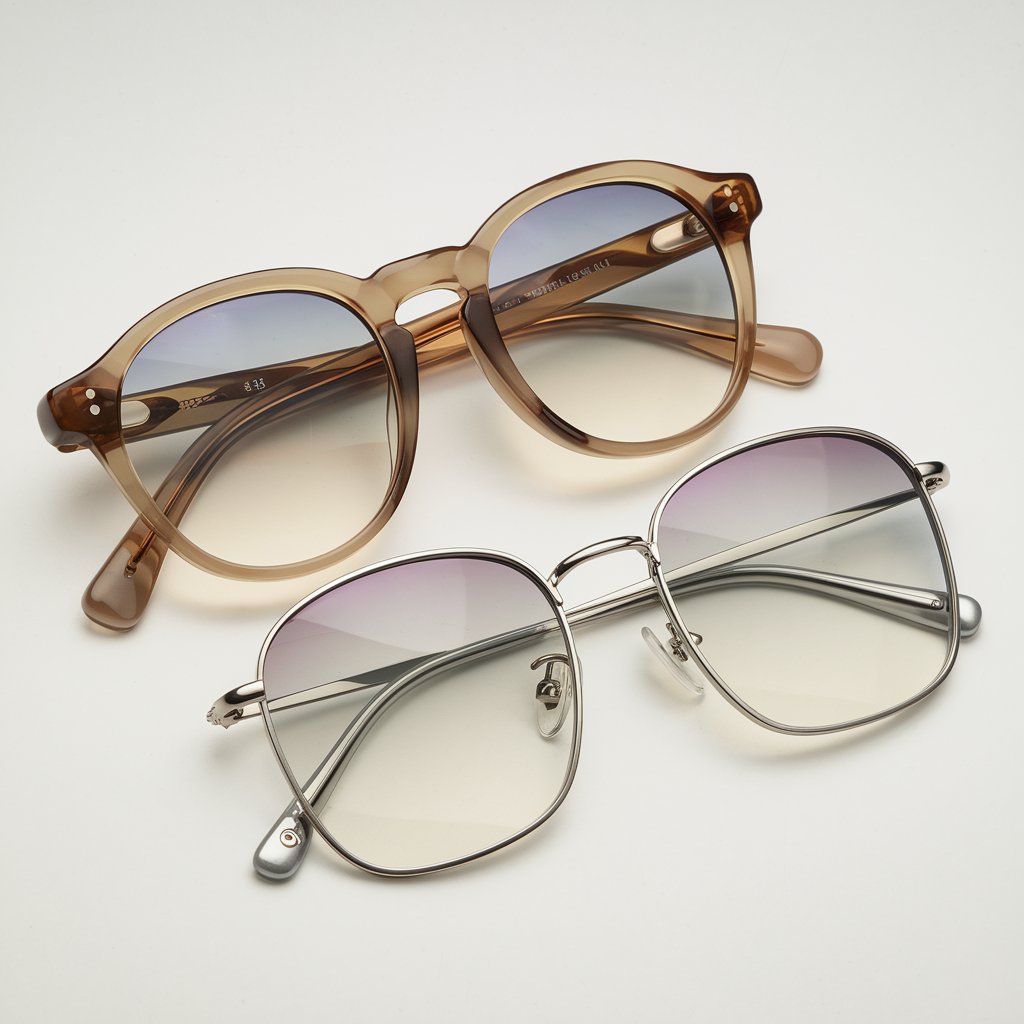
Acetate frames are an excellent choice for prescription sunglasses because they offer a broad range of sizes and styles, making them ideal for a personalized fit. The thickness of the acetate frame allows for the secure attachment of prescription lenses. Additionally, acetate frames are comfortable and flexible, which makes them suitable for daily wear.
Metal frames also work well for prescription lenses, and their adjustable nature makes them an excellent choice for a customized fit. They are especially well-suited for people who need a more precise fit around the temples or nose. Metal frames are lighter than acetate frames, making them more comfortable for some individuals, particularly if you wear your sunglasses for extended periods.
In conclusion, both acetate and metal frames can be suitable for prescription sunglasses, but acetate provides more flexibility in terms of design and comfort. Metal frames are a great option for those who value durability and a sleek, professional look. Choose based on your personal style and fit preferences.
| Frame Material | Compatibility with Prescription Lenses | Comfort | Customization |
|---|---|---|---|
| Acetate | High | Comfortable | High |
| Metal | High | Adjustable | Moderate |
15. How to Choose Between Acetate and Metal Frames for Sunglasses?
Now that we’ve explored the key benefits of acetate and metal frames, how do you decide which one is right for you? Here’s the deal: choosing between acetate and metal frames depends on several factors, including your personal preferences, lifestyle, and specific needs.
If you prioritize customization and style, acetate frames are the clear winner. They come in a wide variety of colors, patterns, and shapes, making them ideal for fashion-forward individuals who want to make a bold statement. Additionally, acetate is lightweight and comfortable, making it perfect for long-term wear.
If durability, strength, and a timeless look are more important to you, then metal frames should be your go-to choice. Metal frames are more resistant to bending and breaking, making them a good option for people who need their sunglasses to withstand everyday wear. Metal frames also offer a sleek, minimalist style that works well with any outfit.
In the end, both acetate and metal frames have their strengths. It all comes down to your personal preferences and what you’re looking for in a pair of sunglasses. Consider factors like comfort, durability, style, and fit before making your decision. Whichever material you choose, ensure that your sunglasses not only look great but also serve your needs.
| Key Consideration | Acetate Frames | Metal Frames |
|---|---|---|
| Comfort | High | Moderate |
| Durability | Moderate | High |
| Style | Bold, customizable | Sleek, minimalist |
| Price Range | Moderate | High (for titanium) |
Conclusion
In conclusion, choosing between acetate and metal frames for your sunglasses comes down to your personal needs and preferences. Acetate frames offer flexibility, customization, and comfort, making them ideal for fashion-forward individuals. On the other hand, metal frames are durable, adjustable, and provide a classic look that never goes out of style. Each material has its unique benefits, so consider factors like durability, comfort, design, and price when making your decision. By understanding the strengths of each material, you’ll be able to select the best pair of sunglasses for your lifestyle. Ultimately, whether you choose acetate or metal frames, both offer high-quality options that can enhance your vision and style.
FAQ Section
Q1: What is the difference between acetate and metal frames for sunglasses?
Acetate frames are flexible, customizable, and lightweight, offering a comfortable fit, while metal frames are durable, adjustable, and provide a sleek, minimalist look.
Q2: How do acetate and metal frames compare in terms of comfort?
Acetate frames are lightweight, flexible, and hypoallergenic, making them more comfortable for long wear. Metal frames are adjustable but may feel heavier on the face.
Q3: Which material is more durable—acetate or metal?
Metal frames tend to be more durable, offering greater resistance to bending and breaking. Acetate frames, while durable, are more prone to cracking under impact.
Q4: Which material offers better style and customization options?
Acetate offers more customization in terms of colors and patterns, while metal provides a sleek, classic look but fewer customization options.
Q5: How do I choose between acetate and metal frames for my sunglasses?
Consider factors like comfort, durability, style preference, and face shape. If you want lightweight, customizable frames, go for acetate. For durability and a classic look, metal frames are ideal.

